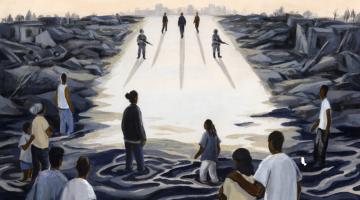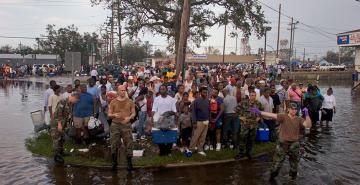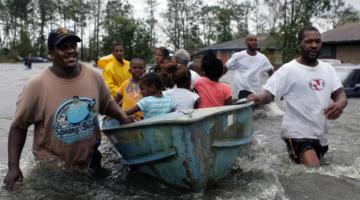BAR Book Forum: Chandra Bhimull’s “Empire in the Air“and Kyle Mays’ “Hip Hop Beats”
An author disentangles transatlantic slavery and transatlantic flight; another writer imagines a world where Black and Indigenous Lives actually matter.
“How race and racism shaped the advent of airline travel.”
In this series, we ask acclaimed authors to answer five questions about their book.
This week’s featured authors are Chandra D. Bhimulland Kyle Mays. Bhimull is Associate Professor at Colby College, where she teaches in the Department of Anthropology and the African-American Studies Program. Her book is Empire in the Air: Airline Travel and the African Diaspora.
Mays is Assistant Professor in the Department of African American Studies and the American Indian Center, UCLA. His book is Hip Hop Beats, Indigenous Rhymes: Modernity and Hip Hop in North America.
Chandra Bhimull’s Empire in the Air
“Airline travel profoundly altered the terrains of oppression.”
Roberto Sirvent:How can your book help BAR readers understand the current political and social climate?
Chandra Bhimull: My book is about oppression and flight. It recounts how race and racism shaped the advent of airline travel. It relays how the advent of airline travel transformed racism and race. It reveals the colonial origins of an airline we now know as British Airways: Imperial Airways. But it illuminates how people in racially stigmatized places advanced and subverted commercial aviation from the outset.
Empire in the Air is also a story about fragments and the radical love needed to care for them. I wanted to write a book baring links between transatlantic slavery and transatlantic flight; my aim was to entangle two histories often thought apart. I focused on the Caribbean, a region often left out of early air travel history. I dug and searched through the piles of archival and ethnographic sources that I had amassed over years. References to the Caribbean or black people, particularly those of the African diaspora, were relatively scarce. They appeared here and there, in bits and pieces, as asides, brief mentions, a few sentences, and snippets. For me, their almost absence, though aggravating and mind-bendingly heartbreaking, made diasporic sense. It was a scattering. It was a refusal to be erased. But what I saw as almost absence, others saw as negligible presence. For them, slivers and traces were insignificant: they were not enough. They wanted more, to make sense. I wanted to make sense out of what -- and who -- seemed to some like they were “less than.”
Our worlds are riddled with passive-aggressive questions and murderous statements about whose lives and words count, from “why can’t all lives matter” to “explain yourself.” My book, I hope, contributes to our understanding of the histories in, as well as behind, such questions and statements; irradiates how not mattering percolates through institutions like the academy and informs our everyday lives; shows the significance of insignificance.
What do you hope activists and community organizers will take away from reading your book?
Slow-down, process, unfinish.
The book shows how commercial flight reconfigured speed and camouflaged process as it relocated empire and repositioned race in the opening decades of the twentieth century. Airline travel profoundly altered the terrains of oppression. It institutionalized a new kind of upward mobility. It actualized white flight and revolutionized the dimensions of segregation. For those who could afford to access and inhabit the sky, it built up and sped-up their reach. It situated some people and things in the air. Airborne, it moved them over the heads of those on the ground. The aircraft’s vertical and horizontal directional motion made it seem like people below were beneath them. Bound up with all these reorientations and inequality-making practices were the promotion of direct straight-line travel (e.g., the desire for direct, short flights) and the obscuration of the processual experience of flying (e.g., the notion of airliner cabins as spaces rather than places; a flight as a discrete occurrence; and departure/arrival places mattering to airborne passengers more than the ones directly beneath the air route, a power line) – in other words, speed-up, event, end.
Empire in the Air also advocates for love as method, an approach, strategy, and technique that attends to fragments as unfinished pieces. Part of love includes resisting attempts to make fragments whole. It asks us to receive and work with their jagged, disruptive qualities, as we make sense of and out of them. It invites us to mobilize fragments, leaving them cracked and opened for others to pick up and use.
I hope activists and community organizers will take away insights into the geometries of power and planes of oppression, and love. I hope that we will take in process, take to unfinishing, take up slow-down, and take back time, in our struggles too.
We know readers will learn a lot from your book, but what do you hope readers willun-learn? In other words, is there a particular ideology you’re hoping to dismantle?
I often hear folks conflate reading and inaction, from student activists who equate reading books with “not doing anything,” to travelers excited to read a book and “do nothing.” The idea that readers are not doing as they read is not new, or innocuous. It undermines the transformative potential of text. It silences the centuries-old efforts of black people to put reading on the front lines of resistance. Like many of the texts featured in the Black Agenda Report Book Forum, Empire in the Air invites its readers to do work. It encourages us to untether ourselves from our preferred branches of knowledge, wander through other fields of study (aka disciplines), seriously play outside the bounds of bounded subjects (e.g., history, anthropology, literature, physics, geography, etc.), and pursue the emancipation of the imagination. There, we find unconventional ways to assemble knowledge: we read and work with diasporic fragments, unfettered. At times, this feels hard to do. The tendency to lean on disciplines and reject uncertain forms of knowledge is strong. The impulse to disentangle here and now from elsewhere and elsewhen is powerful: the urge to disregard traces, toss aside shards, and deactivate gaps is highly present. Together, the tendency, the impulse, and the urge uphold certain ways to know the world. They nurture the idea that feeds them: reading is not doing. For me, that is a doing that doesn’t “do nothing.” It thwarts radical change.
Who are the intellectual heroes that inspire your work?
People who make black radical knowledge inspire me, particularly those who tend to seek liberation through words. James Baldwin, Octavia Butler, Aimee Meredith Cox, Alexis Pauline Gumbs, Lorraine Hansberry, Zora Neale Hurston, C. L. R. James, Robin D. G. Kelley, George Lamming, Darnell L. Moore, and Ida B. Wells are among them. So are Suzanne Césaire and other black surrealists, as well as N. K. Jemisin and others whose world-building pieces cut across the crisscrossing realms of Afrofuturism, speculative fiction, speculative nonfiction, and political fantasy. The mighty lines of poets such as Elizabeth Alexander, Gwendolyn Brooks, Rita Dove, Claudia Rankine, Nayyirah Waheed, Phillis Wheatley, and Yrsa Daley-Ward inspirit me daily.
In what way does your book help us imagine new worlds?
Empire in the Air is as much about unimagination as it is about imagination. It encourages us to imagine new worlds and unimagine long-standing ones simultaneously. There are different ways to engage in acts of unimagination. In this book, a question’s destabilizing force is key. To help us unimagine airline travel as ordinary, for example, the book asks questions such as: How and for whom is flying commonplace? How did we learn to see planes, not people, in motion when we watch jets move through the sky? What happens to our humanity up there?
Acts of unimagination generate uncertainty, which is important. As we unimagine the ordinariness of flight, we sense the dimensions of power. We start to wonder ifcertain familiar phrases have located and delimited activism (e.g., on the ground), shaping and directing the work that we do. Imagining new worlds involves degrees and levels of affective, dreamy uncertainty; after all, foregone conclusions and other manifestations of the certain are rooted in the world we have created. A vision aligned with such uncertainty (e.g., in the air, up in the air) helps us open up and imagine new grounds for radical change.
Kyle Mays’ Hip Hop Beats
“Indigenous rappers use Hip Hop to create anthems of resistance.”
Roberto Sirvent: How can your book help BAR readers understand the current political and social climate?
Kyle Mays: My book can help Black Agenda Report readers see the similar struggles of Black and Indigenous people on Turtle Island (North America). It will also demonstrate how Black and Indigenous peoples disrupt both settler colonialism and white supremacy by imagining another world, through art and culture, in particular Hip Hop. I unpack issues such as the Flint Water Crisis, the Resistance at Standing Rock, and how Indigenous rappers use Hip Hop to create anthems of resistance to these particular issues and much more. Finally, it opens up an avenue through which we might imagine another world where Black people and Indigenous people can live free of oppression.
What do you hope activists and community organizers will take away from reading your book?
I suppose there are two things I want activists and community organizers to think about: First, how can you engage in decolonial practices and not know the Indigenous stewards of the land on which you’re organizing and also not include Indigenous peoples in your idea of liberation? If all of the land we now call, for example, Canada and the United States was and remains Indigenous land, then how can you exclude them? Remember, though Black people were ripped from their homelands, they didn’t lose all of their Indigenous identities, for they still exist through language and customs that have carried on. So, from Indigenous to Indigenous, be sure to reach out to your Indigenous neighbors. Second, how do we end antiblackness that exists in Indigenous communities? Let’s not forget that there is still the reality that some, a few Indigenous elites, in a few tribal nations, who enslaved Black folks (even as they were trying to maintain their way of life and keep their land); that still needs to be dealt with in a good way. So, I hope we can imagine a world where there is healing for all of us.
We know readers will learn a lot from your book, but what do you hope readers willun-learn? In other words, is there a particular ideology you’re hoping to dismantle?
I hope that readers will unlearn two things: that Indigenous people are still here and challenge the very notion of a traditional/modern binary. Second, they are not bound by stereotypes and the limits of our discourse on cultural appropriation. The first one seems simple but is not. When I tell non-Indigenous people that I work on Indigenous Hip Hop, they say, “I didn’t know that Indigenous people did Hip Hop; so cool!” or something like that. The deep meaning of what they are saying is “I didn’t know Indigenous people are still here and that they engage in Hip Hop culture.” I also want Indigenous people who criticize Indigenous rappers for engaging in the “Black thing,” by asking them to question their very idea of “traditional.” What does that mean and, when invoked, who does it exclude, and what limits does it place on Indigenous creativity? Our ancestors surely shared songs, stories, and material cultures with other Indigenous peoples before colonization, so why wouldn’t we do that now? The second thing is that Indigenous rappers challenge the discourse on cultural appropriation not so much through constantly worrying about what white people are doing; instead, they focus on issues of power and produce great art that just forces (white) settlers to deal with the fact of their ongoing presence! I think that’s a beautiful thing.
Who are the intellectual heroes that inspire your work?
This is a dope question! Well, lemme offer the names in certain eras and those I return to often to read. W.E.B. Du Bois and Charles Eastman; Malcolm X and James Baldwin and Audre Lorde; Geneva Smitherman and Judy Mays; and Leanne Simpson. W.E.B. Du Bois is an obvious choice—I mean, he only wrote several books like The Souls of Black Folks and Black Reconstruction! I want to be as prolific as he was. Charles Eastman was a Santee Dakota medical doctor, writer and activist in the early 20thcentury. Like Du Bois, he was very prolific, and cared so much about the image of Indigenous peoples in the United States and worked tirelessly to challenge that image. I read The Autobiography of Malcolm X every summer. It changed my whole life. He loved Black people so much and was bold and unapologetic about it. He taught me that I should always speak the gospel truth, no matter what. Uncle James Baldwin, as I affectionately call him, influences me to be a witness—through my writing. I have a responsibility to write in a manner that is accessible and to serve as a witness to the state of my people, Black and Indigenous (and others).
“Without love for our human and non-human relatives and compassion, we won’t amount to much.”
Geneva Smitherman, aka Dr. G, is a University Distinguished Professor Emerita, based in Michigan. She taught me to write in a way that the people can understand, and more importantly, the power of language and how it shapes our everyday world. She, to me, is an intellectual giant among giants for her contribution to the study of Black American language and culture. Judy Mays is my auntie. She founded the third-ever school in United States history; it was called Medicine Bear American Indian Academy in Detroit, Michigan. She taught me to always work on behalf of the community and imagine a world where Indigenous students can thrive. Finally, Leanne Simpson always influences me to write with compassion and love, for without love for our human and non-human relatives and compassion, we won’t amount to much.
In what way does your book help us imagine new worlds?
This book will help everyone imagine a world in two ways. First, that Black cultures and Indigenous cultures can co-exist on Turtle Island and resist white supremacy and settler colonialism at the same time. Too often, we see these struggles as separate issues. And while the material histories of these twin oppressions might seem different, they are produced with the same ideologies: exploitation and greed. Through art and culture, this book will help readers imagine another world where Black and Indigenous Lives actually matter, and find new language(s) of resistance again, through art. Finally, they imagine a world where we don’t necessarily have to worry about cultural appropriation, and can momentarily escape the settler gaze, and focus on working amongst ourselves to have a world where patriarchy, racism, and colonialism, among other things, vanishes. The last thing I will say is this: instead of focusing on how white people are constantly appropriating our cultures, how about we focus our collective energies on creating the new world we want to live in? After all, as one of my academic auntees told me, “white folks gone be white folks, so why bother thinking about them so much?!”
Roberto Sirvent is Professor of Political and Social Ethics at Hope International University in Fullerton, CA. He also serves as the Outreach and Mentoring Coordinator for the Political Theology Network. He’s currently writing a book with fellow BAR contributor Danny Haiphong called American Exceptionalism and American Innocence: A People’s History of Fake News—From the Revolutionary War to the War on Terror.
COMMENTS?
Please join the conversation on Black Agenda Report's Facebook page at http://facebook.com/blackagendareport
Or, you can comment by emailing us at comments@blackagendareport.com



















